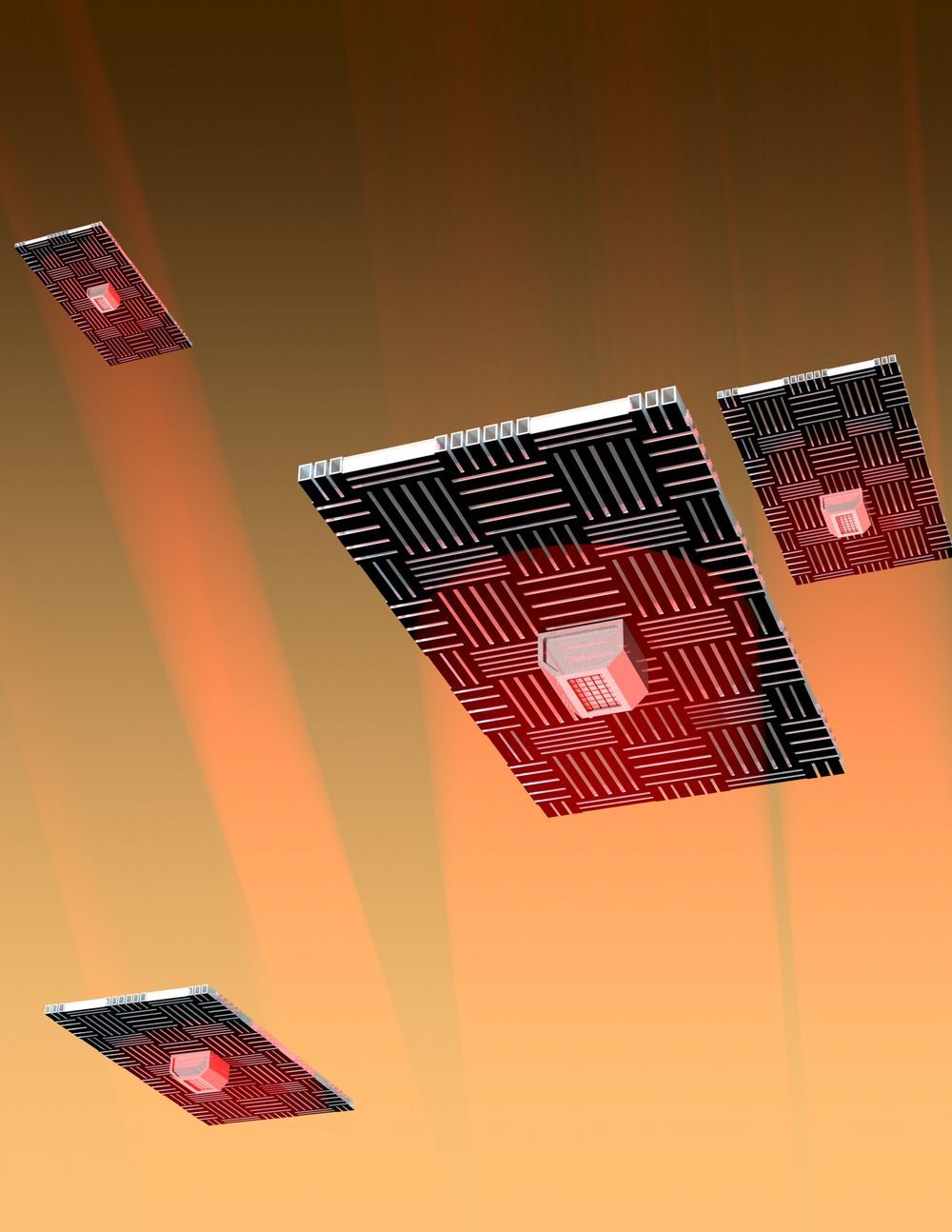The asteroid, identified as 2020 GB2, is 98ft tall – the equivalent height of six double decker buses stacked on top of one another.



O,.O woah!
This summer, NASA plans to launch its next Mars rover, Perseverance, which will carry with it the first aircraft to ever fly on another planet, the Mars Helicopter. As the first of its kind, the Mars Helicopter will carry no instruments and collect no data—NASA describes merely flying it all as “high-risk, high-reward” research.
With the risks of extraterrestrial flight in mind, Penn Engineers are suggesting a different approach to exploring the skies of other worlds: a fleet of tiny aircraft that each weigh about as much as a fruit fly and have no moving parts.
These flyers are plates of “nanocardboard,” which levitate when bright light is shone on them. As one side of the plate heats up, the temperature differential gets air circulating through its hollow structure and shooting out of the corrugated channels that give it its name, thrusting it off the ground.

Using machine learning three groups, including researchers at IBM and DeepMind, have simulated atoms and small molecules more accurately than existing quantum chemistry methods. In separate papers on the arXiv preprint server the teams each use neural networks to represent wave functions of electrons that surround the molecules’ atoms. This wave function is the mathematical solution of the Schrödinger equation, which describes the probabilities of where electrons can be found around molecules. It offers the tantalising hope of ‘solving chemistry’ altogether, simulating reactions with complete accuracy. Normally that goal would require impractically large amounts of computing power. The new studies now offer a compromise of relatively high accuracy at a reasonable amount of processing power.
Each group only simulates simple systems, with ethene among the most complex, and they all emphasise that the approaches are at their very earliest stages. ‘If we’re able to understand how materials work at the most fundamental, atomic level, we could better design everything from photovoltaics to drug molecules,’ says James Spencer from DeepMind in London, UK. ‘While this work doesn’t achieve that quite yet, we think it’s a step in that direction.’
Two approaches appeared on arXiv just a few days apart in September 2019, both combining deep machine learning and Quantum Monte Carlo (QMC) methods. Researchers at DeepMind, part of the Alphabet group of companies that owns Google, and Imperial College London call theirs Fermi Net. They posted an updated preprint paper describing it in early March 2020.1 Frank Noé’s team at the Free University of Berlin, Germany, calls its approach, which directly incorporates physical knowledge about wave functions, PauliNet.2

What do you think about.this?
Coronavirus patients taking hydroxychloroquine, a treatment touted by President Trump, were no less likely to need mechanical ventilation and had higher deaths rates compared to those who did not take the drug, according to a study of hundreds of patients at US Veterans Health Administration medical centers.
The study, which reviewed veterans’ medical charts, was posted Tuesday on medrxiv.org, a pre-print server, meaning it was not peer reviewed or published in a medical journal. The research was funded by the National Institutes of Health and the University of Virginia.


An enduring question in geology is when Earth’s tectonic plates began pushing and pulling in a process that helped the planet evolve and shaped its continents into the ones that exist today. Some researchers theorize it happened around four billion years ago, while others think it was closer to one billion.
A research team led by Harvard researchers looked for clues in ancient rocks (older than 3 billion years) from Australia and South Africa, and found that these plates were moving at least 3.2 billion years ago on the early Earth. In a portion of the Pilbra Craton in Western Australia, one of the oldest pieces of the Earth’s crust, scientists found a latitudinal drift of about 2.5 centimeters a year, and dated the motion to 3.2 billion years ago.
The researchers believe this shift is the earliest proof that modern-like plate motion happened between two to four billion years ago. It adds to growing research that tectonic movement occurred on the early Earth. The findings are published in Science Advances.

Unknown activists have posted nearly 25,000 email addresses and passwords allegedly belonging to the National Institutes of Health, the World Health Organization, the Gates Foundation and other groups working to combat the coronavirus pandemic, according to the SITE Intelligence Group, which monitors online extremism and terrorist groups.
While SITE was unable to verify whether the email addresses and passwords were authentic, the group said the information was released Sunday and Monday and almost immediately used to foment attempts at hacking and harassment by far-right extremists. An Australian cybersecurity expert, Robert Potter, said he was able to verify that the WHO email addresses and passwords were real.
Subscribe to the Post Most newsletter: Today’s most popular stories on The Washington Post
Bing COVID-19 tracker: Latest numbers by country and state
The lists, whose origins are unclear, appear to have first been posted to 4chan, a message board notorious for its hateful and extreme political commentary, and later to Pastebin, a text storage site, to Twitter and to far-right extremist channels on Telegram, a messaging app.

THE HAGUE, Netherlands (AP) — All it took was a few sturdy swings with a sledgehammer and a prized painting by Vincent van Gogh was gone.
A Dutch crime-busting television show has aired security camera footage showing how an art thief smashed his way through reinforced glass doors at a museum in the early hours of March 30. He later hurried out through the museum gift shop with a Vincent van Gogh painting tucked under his right arm and the sledgehammer in his left hand.
Police hope that publicizing the images will help them track down the thief who stole Van Gogh’s “The Parsonage Garden at Nuenen in Spring 1884” from the Singer Laren Museum while it was shut down due to coronavirus containment measures.

China’s expanding aircraft carrier fleet needs fighters — and they might be stealthy.
By Caleb Larson

The US government has contingency plans in place in the event North Korean dictator Kim Jong Un should die after reports that his health was in grave condition.
Sources discussed the plans but urged caution about the veracity of the reports, which claimed Kim is in bad shape after a cardiovascular procedure, Fox News reported.
Those plans include the possibility of a mass-scale humanitarian crisis inside the hermit nation such as a famine, according to the report.